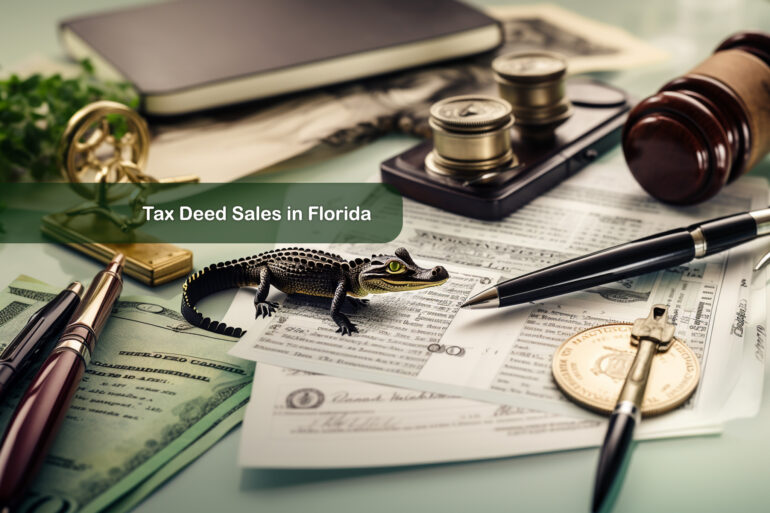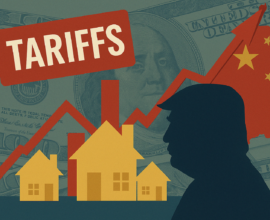Tax Deed Sales in Florida: A Basic Guide
Introduction
Tax deed sales offer a unique opportunity for investors and homebuyers to acquire properties at significantly reduced prices in Florida. As a result of property owners’ failure to pay property taxes, each Florida county conducts tax deed auctions to recoup lost revenue. This article aims to provide a very basic overview of tax deed sales in Florida, including the process, benefits, risks, and essential considerations for prospective buyers.
The potential to acquire properties at significantly reduced prices makes it an attractive investment option
Understanding Tax Deed Sales
Tax deed sales are public auctions where properties with unpaid taxes are sold to the highest bidder. The process begins when property owners fail to pay their property taxes for a specified period, usually two or more years. To recover the delinquent taxes, the local county government, at the request of a tax certificate/lien holder initiates the tax deed sale process. It is important to note that tax deed sales are different from tax lien sales. Tax lien certificate sales are where investors purchase the right to collect interest on the principal balance paid wherein a lien certificate is received in exchange for payment of unpaid property taxes.
The Tax Deed Sale Process
The tax deed sale process in Florida involves several stages. Firstly, the county advertises the sale, providing information about the properties and auction details. Interested bidders must carefully research the properties before the auction. Not every county provides the same level of information to the public regarding the underlying debt, what encumbrances exist, and what liens or payment obligations may survive the tax deed sale process. On the day of the sale, bidders compete virtually (almost all tax deed sales in Florida are conducted online) for the properties they desire.
Tax deed sales allow buyers to bypass the traditional real estate market, avoiding realtor commissions and lengthy negotiations.
During the auction, bidding typically starts with the total amount of unpaid taxes, interest, and additional fees as well as one-half of the tax-assessed value for properties being sold where the property is the homestead of the owner. The highest bidder wins “title” to the property, subject to payment of all required amounts. The winning bidder must pay for the property in full, either immediately or within a specified timeframe (usually within a maximum of 24 hours post-auction). Once the payment is made, the property ownership is transferred to the buyer through a tax deed. Tax deeds are usually recorded by the county within a few days after the date of the sale.
Benefits of Tax Deed Sales
Tax deed sales offer several advantages for investors and homebuyers. Firstly, the potential to acquire properties at significantly reduced prices makes it an attractive investment option. Buyers can find real estate with considerable potential for appreciation or rental income. Additionally, tax deed sales allow buyers to bypass the traditional real estate market, avoiding realtor commissions and lengthy negotiations.
Risks and Considerations
While tax deed sales can be lucrative, they come with inherent risks. Buyers must conduct thorough research on the properties, as they are sold “as is,” without any guarantees or warranties and without clear and marketable title. Properties may have outstanding liens or other encumbrances that buyers become responsible for. It is crucial to carefully review all available information, including title records and property inspections.
Furthermore, some properties sold at tax deed auctions may be occupied by tenants or homeowners. Buyers must familiarize themselves with the laws regarding eviction and ensure they have a plan in place to address any existing occupants.
Tax deed sales in Florida provide an opportunity for investors and homebuyers to acquire properties at significantly reduced prices. However, it is essential to approach these auctions with careful consideration and due diligence.
In Florida, when a tax deed sale occurs, certain liens may survive the sale, while others may be extinguished. The specific liens that survive a Florida tax deed sale depend on the type of lien and its priority. Here are some key points to consider:
- Superior liens: Superior liens, such as liens held by the United States government or Florida state agencies, generally survive a tax deed sale. These liens include federal tax liens, state tax liens, and special assessment liens.
- Subordinate liens: Subordinate liens, including mortgages, judgments, condominium and homeowner association liens, and other types of liens, are typically extinguished by a Florida tax deed sale. However, it’s important to note that the process for extinguishing these liens may vary, and interested parties should consult with legal professionals for specific guidance.
- Liens not properly notified: If a lienholder’s interest in the property was not properly notified before the tax deed sale, their lien may be extinguished. Florida law requires proper notification to interested parties, giving them an opportunity to pay off the delinquent taxes or redeem the property.
- Government liens not properly notified: If the governmental agency holding a lien fails to properly notify interested parties, their lien may also be extinguished.
Post-Auction Process
After successfully purchasing a property at a tax deed sale, buyers must navigate the post-auction process. This includes obtaining a quiet title, which clears any potential ownership disputes, and addressing any existing liens or encumbrances.
Conclusion
Tax deed sales in Florida provide an opportunity for investors and homebuyers to acquire properties at significantly reduced prices. However, it is essential to approach these auctions with careful consideration and due diligence. Thorough research, property inspections, and legal advice are crucial to mitigate risks and maximize the potential benefits of tax deed sales. By understanding the process and considering the associated risks, buyers can make informed decisions and potentially find valuable real estate opportunities in Florida.







